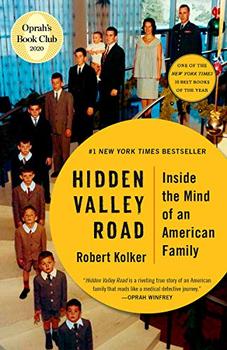Summary | Excerpt | Reading Guide | Reviews | Beyond the Book | Readalikes | Genres & Themes | Author Bio

Inside the Mind of an American Family
by Robert Kolker
On a crisp winter afternoon in 2017—forty-five years, a lifetime, after that day on the hill—the woman once known as Mary Galvin pulls her SUV into a parking space at Point of the Pines, an assisted living facility in Colorado Springs, and walks inside to see the brother she once fantasized about burning alive. She is in her fifties now, with the same bright eyes, though in her adulthood she has chosen to go by a different first name: Lindsay, a name she picked as soon as she left home—a determined young girl's attempt to make a break with the past and become someone new.
Lindsay lives a six-hour drive away, just outside Telluride, Colorado. She owns her own business, staging corporate events—working as hard as her father ever did, crisscrossing the state between home and Denver, where most of her events take place, and Colorado Springs, where she can tend to Donald and others in her family. Her husband, Rick, runs instructor training for the Telluride ski school, and they have two teenagers, one in high school and one in college. Anyone who meets Lindsay now usually doesn't see past her calm confidence, her easy smile. After years of practice, she has an artful way of pretending as if everything is completely normal, even when the case is quite the opposite. Only a tart, razor-sharp comment now and then suggests something else—something melancholic and immutable, simmering beneath the surface.
Donald is waiting for her in the first-floor lounge. Dressed casually in a wrinkled, untucked Oxford shirt and long cargo shorts, her oldest brother, in his seventies now, looks incongruously distinguished, with wisps of white hair at his temples, a cleft chin, and heavy black eyebrows. He could be cast in a gangster movie, if his voice weren't so gentle and his gait so stiff. "He has a little bit of that Thorazine shuffle still left, the way he walks," says Kriss Prado, a manager at the facility. Donald takes clozapine now, a sort of last-resort psychotropic drug with both a high rate of effectiveness and a high risk of extreme side effects—heart inflammation, low white blood cell count, even seizures. One of the consequences of surviving schizophrenia for fifty years is that sooner or later, the cure becomes as damaging as the disease.
When Donald spots his sister, he stands up, ready to leave. Usually, when Lindsay visits, it's to take him out to see other family. Smiling warmly, Lindsay says they're not going anywhere today—that she is there to see how he is doing and to talk with his doctors. Donald smiles, too, slightly, and sits back down. No one in his family comes to see him there but her.
Lindsay has had decades to make sense of her childhood, and in many ways that project continues. So far, she has learned that the key to understanding schizophrenia is that, despite a century of research, such a key remains elusive. There is a menu of symptoms, various ways the illness presents: hallucinations, delusions, voices, comalike stupors. There are specific tells, too, like the inability to grasp the most basic figures of speech. Psychiatrists speak of "loosening of associations" and "disorganized thinking." But it is hard for anyone to explain to Lindsay why, on a day like today, Donald is cheerful, even content, while on another day he is frustrated, demanding she drive him to the state mental hospital in Pueblo, where he has been admitted more than a dozen times over fifty years, and where he often says that he would like to live. She can only guess why, when Donald is brought to the supermarket, he always buys two bottles of All clothing detergent, announcing brightly, "This is the best body wash ever!" Or why, almost fifty years later, he still recites that religious litany: Benedictine, Jesuit, Order of the Sacred Heart... . Or why, for almost as long, Donald has consistently and unwaveringly maintained that he is, in fact, the offspring of an octopus.
Excerpted from Hidden Valley Road by Robert Kolker. Copyright © 2020 by Robert Kolker. All rights reserved. No part of this excerpt may be reproduced or reprinted without permission in writing from the publisher.
Your guide toexceptional books
BookBrowse seeks out and recommends the best in contemporary fiction and nonfiction—books that not only engage and entertain but also deepen our understanding of ourselves and the world around us.